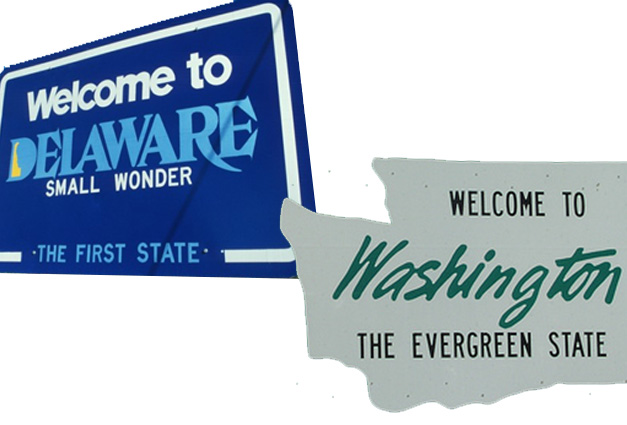
Enough has been written about this popular topic and the best reasons for choosing one state or the other. In this blog, I like to showcase some not so well known yet interesting facts about incorporating in these states.
First, some essential truths:
If your main offices are in Washington and you do not plan on moving elsewhere, incorporating in either State is fine. If you are cash constrained and like to keep cost down for the next 12 months, Washington incorporation will satisfy your needs for that time and beyond. In the event it becomes necessary to have a Delaware entity, reincorporation is always an option.
If you think of seeking VC funding and may worry about VCs insisting on incorporating in Delaware, going for Delaware is the best. Incorporating, maintaining, trouble shooting issues, reorganizing, or dissolving a company in Washington is definitely less expensive than in Delaware. Washington corporate law is largely similar to Delaware law. Best analysis of this subject so far in my opinion is written by the startup attorney Joe Wallin.
Then, beyond the essentials:
- Most Fortune 500 companies are incorporated in Delaware or Nevada because it is easier for large public companies with thousands of shareholders to comply with securities law requirements in these states and the Wall Street underwriters often require this.
- In the event of a preference of a Delaware entity, reincorporation (conversion of a Washington company to a Delaware company while the original date of incorporation still remains the same) can easily be arranged under Delaware Corporation Law.
- Both Microsoft and Costco are Washington corporations. They both were incorporated in one state or the other originally, and then later reincorporated in Washington for the final time. High cost of maintenance in Delaware was a factor in their decisions to reincorporate in Washington.
- Per Microsoft investor relations – Microsoft was first incorporated in Washington in 1981; reincorporated in Delaware in 1986; and reincorporated again in Washington in 1993. Microsoft became a public company in 1986.
- In the case of Costco, the reincorporation in Washington took place while the company was listed on Nasdaq. The desire to reduce the amount of corporate franchise taxes in Delaware was a key factor in the decision. If Costco felt the franchise tax of $150,000 was too onerous (in 1998), you probably might feel the same about cost at some point. But you may not if your capital structure and assets are not too high to warrant high franchise tax.
- Boeing was first incorporated in Washington in 1916; later reincorporated in Delaware in 1934.
- Starbucks was incorporated in Washington in 1985, went public in 1992 and it continues to remain a Washington corporation.
- Amazon.com was incorporated in 1994 in the state of Washington, reincorporated in May of 1996 in Delaware, and went public in May of 1997.
- The main reason for popularity of Delaware incorporate comes from the fact that Delaware is definitely far superior to California as a state of incorporation. Since most new startups come from the Silicon Valley, this practice dominates in the collective thinking of the investors (especially VCs). California corporation law is clearly inferior to many other states including Delaware and Washington.
- Selecting Washington or Delaware does not give your company an advantage in corporate income tax. If your company is doing business in a certain State with state income tax, unless exempted, the company is required to pay taxes on its federal taxable income earned in that State based on property, wages and sales in that State.
- Even if you receive a Delaware franchise tax estimate over $100K, based on your issued shares and the value of the assets (if they are not so high), you are most likely to be able to reduce the franchise tax to less than $2-3000 (for startups this is often under $1000). If you do not know how to do this, give us a call and we will show you how.
- Irrespective of where you incorporate, your company can still choose to be governed by the laws and courts of Washington or another state of preference in your transactions with 3rd parties.
- To have your personal assets protected from business-related liabilities, your company must be registered to do business as a foreign corporation in the state where it is doing business. Not doing so may expose your personal assets against future claims.
Summary of Important Distinctions
| Washington | Delaware |
| Annual maintenance fee is $71 irrespective of the amount of capitalization. | Annual license renewal fee depends on the amount of capitalization and value of the assets. Annual Franchise Tax can be up to $180,000. It is a minimum of ~$700 more to maintain in Delaware. |
| Major changes to corporate structure, requires approval by 2/3ds of the shareholders, unless otherwise specified.
|
Same changes require only a simple majority of the shareholders.
|
| Superior indemnification and protection of directors and officers from 3rd party and shareholder claims.
|
Though Delaware has recently amended its laws to address some of the concerns regarding indemnification provisions, they are still below what Washington offers. |
| Release of directors from personal liability and monetary damages for acts or omissions except for 3 exclusions (intentional misconduct or a knowing violation of law; unlawful distributions; or personal benefits received in money, property or services not legally entitled) | Same release as Washington with 2 additional exclusions (breach of duty of loyalty; and acts or omissions not in good faith. In the case of The Walt Disney Company Derivative Action, directors of Delaware companies were subject to claims of breach of duties of loyalty or good faith. |
| Fewer court cases interpreting Washington Corporation Act. Washington courts often refer to Delaware case law as guidance on relevant issues.
|
Large body of corporate law, court decisions, on governance and in M&A context, and greater predictability of legal consequences.
|
By Shanika Weerasundara.
